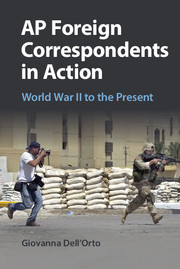Book contents
- Frontmatter
- Dedication
- Contents
- List of Figures
- Acknowledgments
- 1 Introduction
- 2 Getting Ready, Getting Started, and Getting Lost in Translation
- 3 What's the Story? News Judgment, News Pitches
- 4 Getting to the Sources (and Keeping Them Alive)
- 5 Being an American Abroad – Perceptions of Journalists
- 6 Eyewitness Reporting: Getting to the Scene
- 7 The Costs of Being There to Count the Bodies
- 8 Your Byline Today, Mine Tomorrow: Teamwork and Competition
- 9 Access, Censorship, and Spin: Relating with Foreign Governments
- 10 Flacks, Spooks, GIs, and Objective Journalists: Relating with the U.S. Government Abroad
- 11 Getting It Out, Getting It Edited: Filing News, Working with the Desk
- 12 The Evolving Milkmen: Writing for an Audience
- 13 Purpose and Influence of Foreign Correspondence
- 14 Eight Decades of Bearing Witness and Telling the World's Stories: Conclusions
- Bibliography
- Index
6 - Eyewitness Reporting: Getting to the Scene
Published online by Cambridge University Press: 05 November 2015
- Frontmatter
- Dedication
- Contents
- List of Figures
- Acknowledgments
- 1 Introduction
- 2 Getting Ready, Getting Started, and Getting Lost in Translation
- 3 What's the Story? News Judgment, News Pitches
- 4 Getting to the Sources (and Keeping Them Alive)
- 5 Being an American Abroad – Perceptions of Journalists
- 6 Eyewitness Reporting: Getting to the Scene
- 7 The Costs of Being There to Count the Bodies
- 8 Your Byline Today, Mine Tomorrow: Teamwork and Competition
- 9 Access, Censorship, and Spin: Relating with Foreign Governments
- 10 Flacks, Spooks, GIs, and Objective Journalists: Relating with the U.S. Government Abroad
- 11 Getting It Out, Getting It Edited: Filing News, Working with the Desk
- 12 The Evolving Milkmen: Writing for an Audience
- 13 Purpose and Influence of Foreign Correspondence
- 14 Eight Decades of Bearing Witness and Telling the World's Stories: Conclusions
- Bibliography
- Index
Summary
I had a vacation to Indonesia, if you can think of any place that's farther away [from Egypt]. From January 25th to literally February 11th [2011]. I scheduled a three-week vacation that entirely matched up to the days of the revolution. I left knowing there were reports that there was going to be this big demonstration. But … every other demonstration hadn't worked. Why would this one suddenly work? Why would this one spark the thing? … We landed in Dubai, and I saw the news and … my jaw dropped. And then every day for the next three or four days, in Indonesia, people are calling up, “Where are you? Are you going to be …?” I'm like, “I'm not in the country, I'm not there.” … And then one day I woke up and it was 2 in the morning Cairo time, 6 in the morning Indonesia time, and I saw the NDP [National Democratic Party] building on Jazeera burning. And I realized … this just got real. … [E]ventually, after some of the hardest days of my life, … I quit the vacation. I left my wife and one-and-a-half-year-old child in Indonesia, in Bali. … And then I was there for the last week. And I was in Tahrir Square when [President Hosni] Mubarak resigned. So that was something that was very important to me. (Schemm, 3–4)
Rushing straight into history-making mayhem, as Cairo-based correspondent Paul Schemm did when the Arab Spring erupted while he was vacationing in Bali, is a visceral instinct that all foreign correspondents share – and that sets them apart. The most basic reason for their job, after all, is reporting from the scene, even if it is a scene virtually everyone else is trying to flee, and the drive to be present never stops at office hours in a profession that most consider a calling. This chapter details how correspondents got to be eyewitnesses to some of the most pivotal moments of the past eight decades, what their stories gained from their presence, and the treacherous routes they took – hitchhiking with Libyan rebels and U.S. helicopter pilots, trudging over Afghan mountain passes and earthquake-crumbled roads, and talking their way past checkpoints manned by a gamut of international thugs.
- Type
- Chapter
- Information
- AP Foreign Correspondents in ActionWorld War II to the Present, pp. 147 - 186Publisher: Cambridge University PressPrint publication year: 2015



